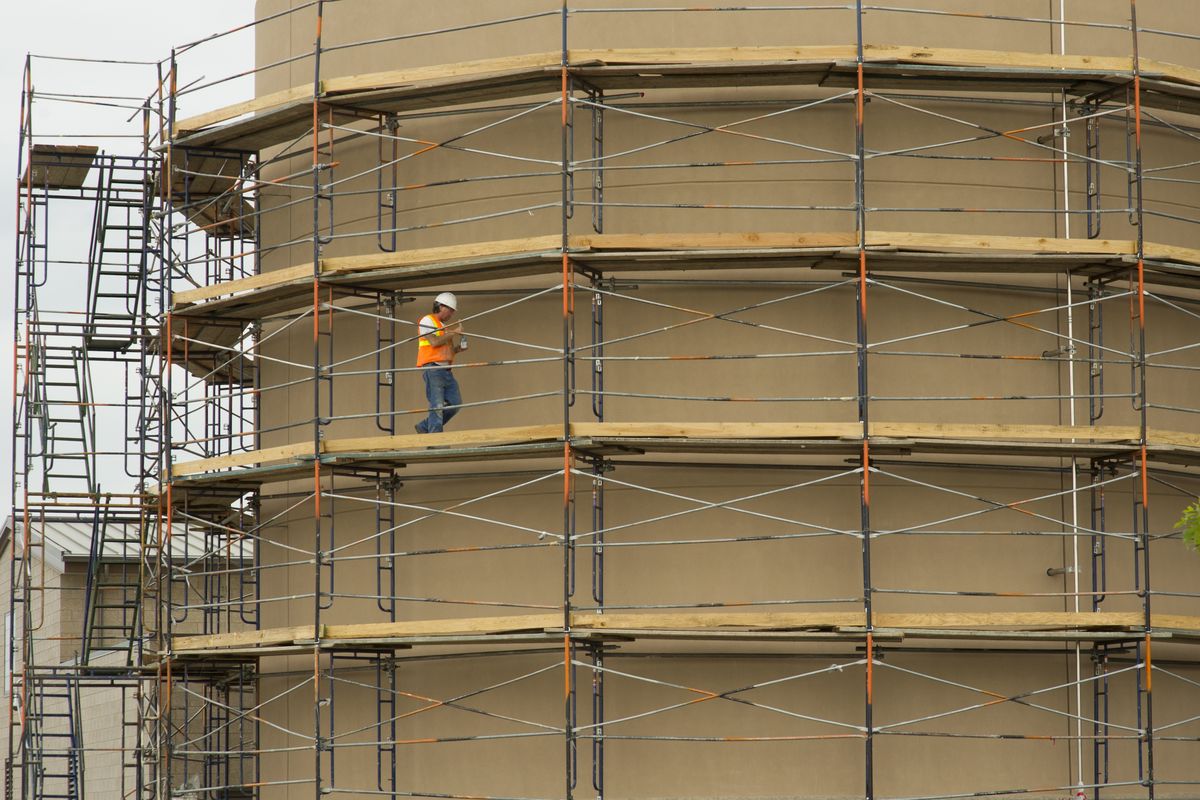Tribe’s river PCB complaint jeopardizes treatment plant
Concerns about cancer- causing agent could seriously delay opening of facility

A permit that was to have been issued last week for Spokane County’s new $173 million sewage treatment plant is on hold.
State and federal environmental regulators are to meet Wednesday with Spokane Tribe officials to discuss tribal concerns.
Until recently, dissolved oxygen has been the primary issue, but the tribe complained late last month that the proposed permit sets no specific limit on cancer-causing polychlorinated biphenyls, or PCBs.
“The new Spokane County permit limit for PCBs must be set at undetectable levels,” tribal Chairman Gregory Abrahamson said in a May 27 letter to the U.S. Environmental Protection Agency.
Efforts Monday to reach the tribe for comment were unsuccessful, but Abrahamson’s letter said the tribe is concerned because fish would be “a significant food source” for its members except for PCBs.
The Spokanes, whose ancestral homelands bordered the Spokane River, have historically been a fishing tribe.
County officials say strict enforcement of the tribe’s standard – a level that can’t be detected in laboratory tests – ultimately could prevent use of their new treatment plant.
Utilities Director Bruce Rawls also fears an extended delay could cost “a few hundred thousand dollars a month” – in part because construction of the plant is about two months ahead of schedule.
Performance tests are now expected to begin in August. If all goes well, the plant could go into operation in November.
Rawls said the county’s design-build-operate contract with CH2M Hill leaves the county vulnerable to delay-based damage claims. The company already has assembled a staff to operate the plant, and some employees have moved from other states.
Rawls said county officials have four or five weeks to decide whether to start testing the plant at 1004 N. Freya St.
Once the testing starts, the plant must remain in at least minimal operation to keep its sewage-munching bacteria alive and to protect membrane filters that cost about $10 million. The county would have to treat a small amount of effluent and send it to the city of Spokane treatment plant.
One way or the other, the county would be in the position of a family that buys a new house before selling its old one.
Currently, the county pays the city to process all of its sewage, but the plant is running short of capacity. County officials decided to build their own plant because of a looming construction moratorium in areas they serve.
Washington Department of Ecology managers had planned to issue a draft permit for the new plant on June 1, triggering a 60-day public comment period. On May 27, though, the Spokane Tribe objected in a letter to the U.S. Environmental Protection Agency.
In addition to the PCB issue, tribal officials argued the state shouldn’t be allowed to give the county a permit before the EPA issues permits to Spokane River dischargers in Idaho, establishing a cleanup plan for the entire river.
Last summer, Post Falls, Coeur d’Alene and the Hayden Area Regional Sewer Board filed suit in federal court, saying they got too small a share of the river’s waste load allocation for phosphorus and other oxygen-robbing substances.
“We don’t want to issue permits that people are upset about,” said Jani Gilbert, an Ecology spokeswoman. However, “We want to get them out as quickly as possible,” she said.
Gilbert said the Ecology Department was moving ahead with Spokane County’s draft permit with the expectation that the Idaho dischargers’ lawsuit would be resolved during a 60-day comment period. If that happened, a final permit could be issued shortly afterward, helping Spokane County meet its deadline, she said.
“I think there is a desire that we get all the permits done at relatively the same time, as much as we can,” said Mike Lidgard, an EPA discharge permit manager.
Lidgard said Wednesday’s meeting will help his agency better understand the tribe’s and Ecology’s position, with the goal of finding common ground.
As troublesome as the dissolved-oxygen problem is, the PCB issue is worse, according to Rawls.
The county has no backup plan in case it can’t meet river discharge standards for PCBs.
Treated wastewater could be discharged onto county land at Saltese Flats from March through October, when dissolved oxygen is worst. But, Rawls said, use of Saltese Flats isn’t feasible in winter months and PCBs are a year-round problem.
The Spokane Tribe’s PCB standard is much stricter than the state’s limit of 170 picograms per liter. The tribe’s limit is 3.37 picograms per liter, which Rawls said is the equivalent of finding four pennies in a three-fourths-mile cube of pennies.
PCBs are a critical issue for the tribe, which has fishing rights on the lower Spokane River and parts of the Columbia River, according to Abrahamson’s letter. In order for the tribe’s members to safely eat fish from the river, PCB levels must come down significantly, the letter said.
Ecology Department officials said the new permits will focus on gradual PCB reductions.
All Washington dischargers would have to start monitoring for PCBs. At the end of three to five years, the monitoring data would be used to set limits, said Dave Moore, Ecology’s Spokane River water quality manager.
In addition, the dischargers would have to establish controls to keep the long-lived pollutants from getting into their system in the first place.
“We’re trying to get those PCB limits as low as we can, and work toward those tribal limits,” Moore said.
Achieving the PCB limits established by the tribe will take “many generations,” he said. “We think this is the way to get expedient progress on PCB reductions, and not fight (for years) over establishing a standard.”
Rawls said Spokane County is committed to the approach outlined by Ecology, and the county’s new treatment plant can help.
He said the plant will remove 80 to 90 percent more PCBs than the city of Spokane plant that currently treats county sewage.